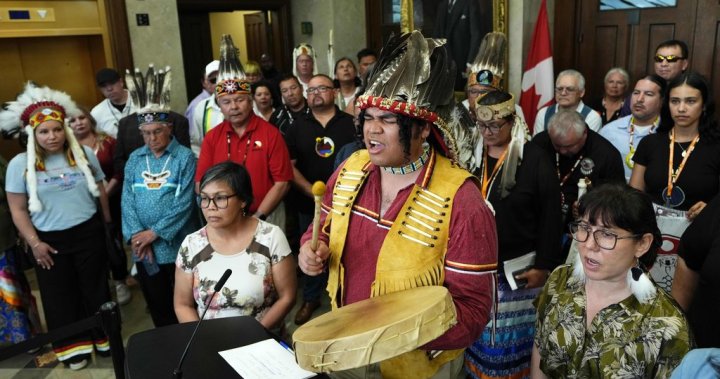As opposition mounted and consultations faltered, the federal government quietly dropped a contentious proposal to amend the Indian Act last week, signaling a retreat on what Indigenous leaders called an overreach into self-governance rights.
The provision, buried within the broader Major Projects Management Office Reform Act (Bill C-70), would have granted Ottawa new powers to override reserve land decisions when deemed in the “national interest” – language that immediately raised red flags among Indigenous communities across the country.
“This wasn’t consultation, it was notification,” said Ghislain Picard, Regional Chief of the Assembly of First Nations Quebec-Labrador, during testimony before the parliamentary committee studying the bill. “We’ve seen this approach before, and communities are rightfully skeptical of promises that come after the fact.”
The amendment would have given federal ministers expanded authority to approve infrastructure projects on reserve lands without band council resolutions in certain cases – a move critics viewed as undermining the principles established in the United Nations Declaration on the Rights of Indigenous Peoples, which Canada formally adopted in 2021.
During a press conference in Vancouver, Indigenous Services Minister Patty Hajdu acknowledged the misstep. “We’ve heard clearly from rights holders that more dialogue is needed. The government remains committed to advancing economic reconciliation, but we must do it in true partnership.”
The controversy has become a significant challenge for Mark Carney, the former Bank of Canada governor turned Liberal candidate, who has championed Bill C-70 as essential to accelerating clean energy projects and boosting Canada’s competitiveness. Carney’s first major political initiative has now become entangled in the complex politics of Indigenous relations.
According to internal documents obtained through access to information requests, the proposed amendment originated from the Ministry of Natural Resources, which sought mechanisms to expedite critical mineral and energy corridors projects. However, departmental emails reveal limited advance engagement with Indigenous leadership before the bill’s introduction in Parliament.
The Yellowhead Institute, an Indigenous-led research center, published an analysis showing the amendment would have potentially affected 38 First Nations communities currently involved in land disputes with energy or transportation corridor proposals.
“What we’re seeing is the collision of two federal priorities – expediting clean energy infrastructure and respecting Indigenous rights,” explained Dr. Hayden King, executive director of the Yellowhead Institute. “But rushing through amendments to the Indian Act without proper consultation only undermines trust in the reconciliation process.”
The government’s retreat came after polling data from Abacus revealed 63% of Canadians believe major project approvals should respect Indigenous rights, even if it means longer approval timelines for critical infrastructure.
This controversy emerges as federal authorities seek ways to match American and European efforts to streamline permitting for green energy projects. With approximately $40 billion in clean energy investments announced for Canada in the past year, industry stakeholders have pressed for faster approvals while environmental and Indigenous groups have called for maintaining robust assessment processes.
Grand Chief Stewart Phillip of the Union of BC Indian Chiefs pointed to deeper issues with the government’s approach. “If Ottawa is serious about economic reconciliation, start by addressing the systemic barriers in the Indian Act itself, not by adding new powers to override our decision-making.”
The Major Projects bill remains before Parliament, with the government indicating it will continue with other streamlining measures while engaging in “meaningful consultation” on any future Indian Act amendments. The legislation still faces scrutiny from opposition parties who questioned the government’s handling of Indigenous relations.
“This government talks a big game about nation-to-nation relationships, but then tries to slip fundamental changes to the Indian Act through the back door,” said Conservative Indigenous Services critic Jamie Schmale during Question Period. “How can First Nations trust this process?”
For communities on the front lines of resource development, the episode highlights ongoing tensions between Ottawa’s economic ambitions and Indigenous sovereignty. Chief Sharleen Gale of Fort Nelson First Nation in British Columbia noted her community wasn’t consulted despite having several major energy projects proposed in their territory.
“We support responsible development, but on our terms and timeline,” said Chief Gale. “The pattern of being consulted after decisions are drafted has to end.”
According to the Assembly of First Nations, over 120 band councils passed resolutions opposing the amendment in the two weeks following its introduction, demonstrating rapid mobilization across Indigenous communities.
The federal government now faces the challenge of rebuilding trust while addressing legitimate concerns about Canada’s complex approval processes for major infrastructure. With election speculation growing, the Liberals can ill afford further missteps on reconciliation.
“This isn’t just about one clause in one bill,” reflected Natan Obed, president of Inuit Tapiriit Kanatami. “It’s about whether Canada truly understands that reconciliation means changing how decisions are made, not just who implements them.”
As the spring parliamentary session continues, the government has promised a “reset” on the consultation process, but many Indigenous leaders remain skeptical that meaningful change will follow.






